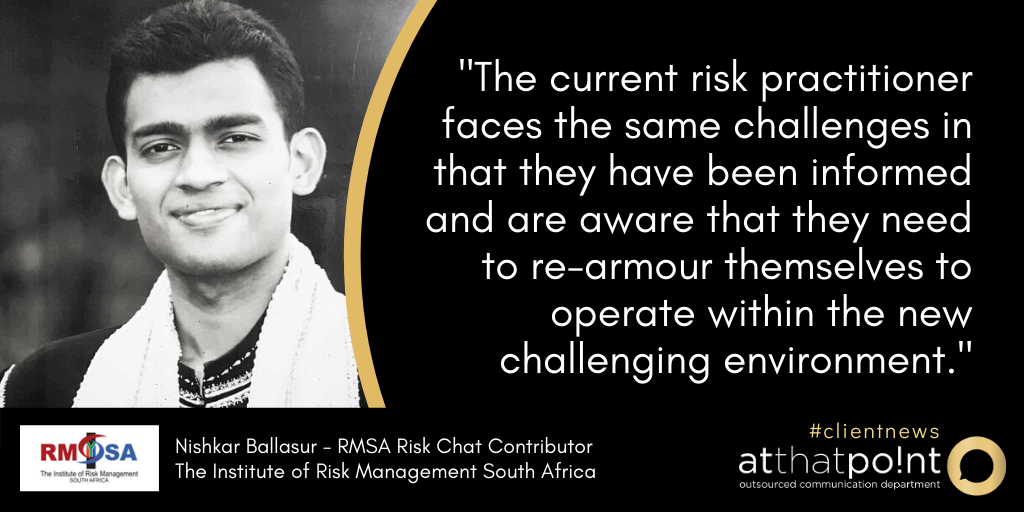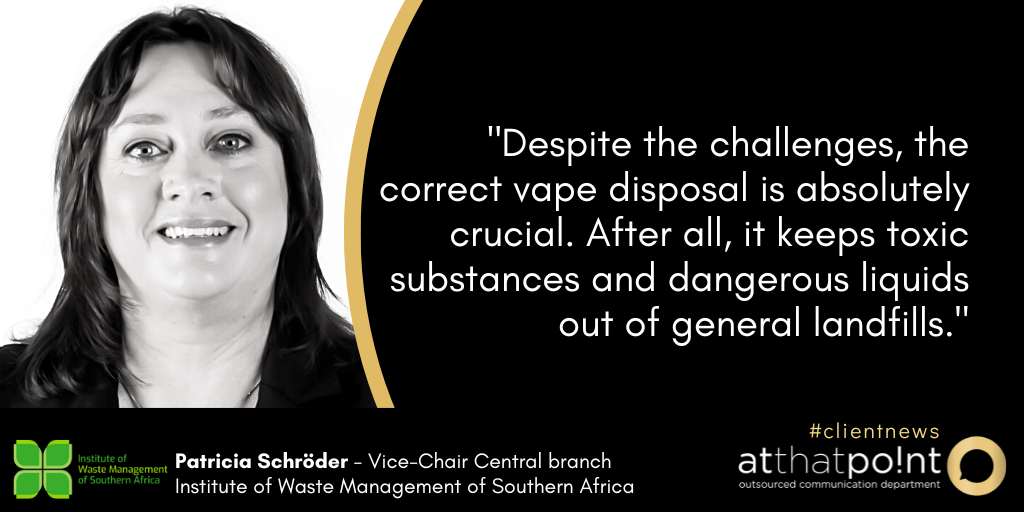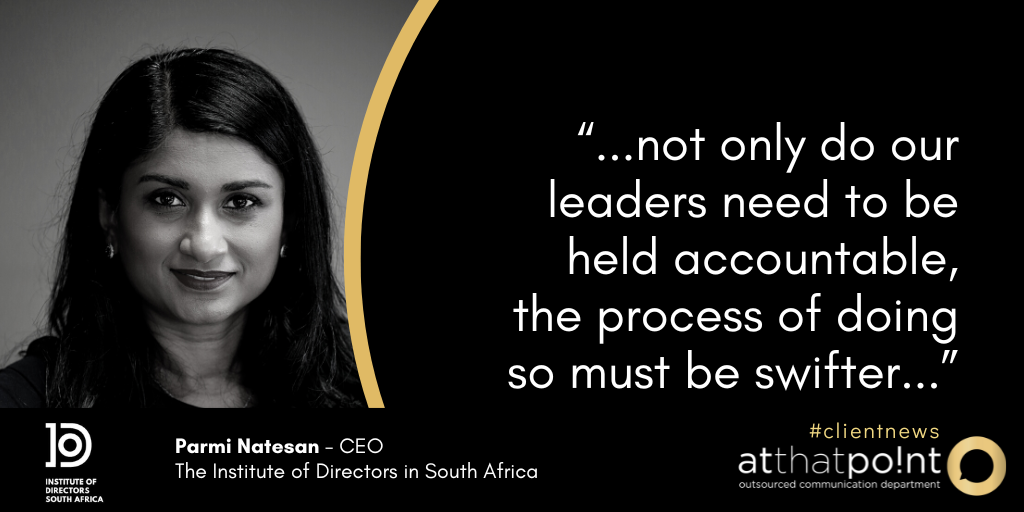|
Authored by: Chandu Kashiram, IRMSA Risk Intelligence Committee Member
COVID-19 has confirmed what Dr Nicholas Crisp had warned us all in the run up to finalising the IRMSA 2020 Risk Report. He warned that the NHI cannot solve all of our Nation’s social ills. Each and every department across the social spectrum has to deliver if the NHI is to succeed. Assuming that all intentions and plans to install a “world class” NHI system in South Africa are successful, it will still not be enough. COVID-19 has placed the best NHI systems in the world under considerable strain. This is mainly due to the system not taking care of the poor and the indigent. According to a recent Daily Maverick article by Richard Poplak (27 March 2020), between 1.1m and 1.4m households fall under the informal settlement category in South Africa. This equates to between 2.9m to 3.6m people. Although the Government has reacted swiftly to put into place the 21 day lockdown, at a practical level the lack of housing, exacerbated by the sheer lack of basic necessities such as running water and ablution facilities, has made the lockdown impractical in poorer communities. Social distancing is nearly impossible to achieve where the disenfranchised live between four to six people in a little one to two square meter shack. Washing hands and staying germ free is a big ask when most people do not have running water and share toilets across many shacks. COVID-19 is putting the spotlight on lack of service delivery and has placed the entire Government into fix-it mode, at huge cost to the economy and the people of South Africa. So what is missing? COVID-19 is also one of those risk events that is a serious “wake-up call”, not just in our country but the world over. It is forcing each country to take a hard look at the following –
Preventative Measures Simple risk management principles require us to identify the risks, and put into place effective preventative and corrective risk mitigating actions. The Government has put an effective council that is putting plans together and working as a team to beat the COVID-19 virus. Labour and business are also part of taking corrective mitigating actions. One of the Ministers even mentioned that the process is unfolding into the development of a blueprint on how various parts of government, labour and business can work together in future to deal with any major challenge. My view is that they should not merely come together to face major challenges or disasters but continue to work together as a matter of course. COVID-19 should be used to understand and develop solutions for the following -
In conclusion, we are merely a few days into the 21 day lock down and already many gaps and missed opportunities of the last 25 years of our democracy have been starkly and unambiguously been revealed. The COVID-19 has ruthlessly placed the truth in front of us all and left no place to hide. Let us therefore use this opportunity to learn from the mistakes of the past and begin our journey to recreate a better South Africa for all of us. The preventative measures are not aimed at Government only. Business, Labour and all South Africans have to do their part to build a much more resilient South Africa. Whilst we contemplate how we will work differently in future, let us also acknowledge to good work government, labour and business has done so far to deal with COVID-19. Let us also acknowledge the frontline staff, the doctors, nurses, healthcare professionals and each and every person providing essential services during these extremely difficult times. To make sure that there sacrifices are not wasted, PLEASE STAY AT HOME! ENDS MEDIA CONTACT: Rosa-Mari, 060 995 6277, [email protected], www.atthatpoint.co.za For more information on IRMSA please visit: Website: https://www.irmsa.org.za/ Twitter: https://twitter.com/IRMSAInsight Facebook: https://www.facebook.com/IRMSAInsight/?ref=hl LinkedIn: https://www.linkedin.com/company/irmsa-institute-of-risk-management-sa/
0 Comments
Authored by: Gillian Le Cordeur, IRMSA CEO
As we navigate our way through this crisis, that not only South Africa but the entire World is dealing with, The Institute of Risk Management South Africa (IRMSA) Executive Committee has highlighted many risks and opportunities associated with the COVID-19 pandemic. It is of critical importance to acknowledge that this pandemic is no longer a risk (it is a risk which has materialised) but has become a cause to many other risks emerging on our country’s risk radar. Two of the most significant risks to have emerged from this pandemic were highlighted; the potential of social unrest and a likely increase in crime. Both these risks if left untreated, have the potential to result in riots, looting, damage to property and harm to people. Not forgetting (on the back of unemployment, the loss of income and poverty) hunger, starvation and desperation. After intense workshops and discussions with our Executive Committee and stakeholders, IRMSA realised that we need to quickly recommend a risk response strategy to support government and these individuals in ‘hot spot’ areas whom have been deeply affected by this lockdown as a result of the Covid-19 crisis. Over the last weekend, we watched with concern how citizens in the Alexandra Township responded to social distancing and the SANDF, and it was clear that whilst we are managing the health risk, we will need to address individuals’ access to food. It is clear that this desperate need for food and basic necessities will be widespread in all townships and informal settlements. IRMSA feels that this is an opportunity for professionals and business leaders to personally play a significant role in managing this risk which will have an impact not only on all organisations but on every single household and citizen in South Africa. After extensive research and engagement with various parties, we made contact with an organisation called FoodForward SA and we will collaborate with this organisation to treat the core of these emerging risks – food distribution to those in need and for those who suddenly are unable to earn a living. Not only is this the right thing to do but an essential risk treatment strategy to address the consequences of social unrest, starvation, desperation and a potential for harm to, or the loss of life. FoodForward SA redistributes edible donated food products and operates as part of the international Global Foodbank Network (GFN). The organisation has an established national distribution footprint enabled by its verified beneficiary network of over 670 charities and over 255 000 people across the country. They already provide 20 million meals per year – but in the next few days to come and then 4 – 6 months, the need is much more. www.foodforwardsa.org While organisations that previously invested in developing robust enterprise-wide risk management processes are still experiencing significant impacts from this unfolding crisis, hopefully their leadership teams will align with IRMSA and take up this opportunity to be more proactive and participate in this drive with IRMSA and Food Forward SA. It is also an opportunity for professionals and leaders to personally to play a significant role in managing this risk which will have an impact not only on all organisations but on every single household and citizen in South Africa. In order to be part of the solution to this immediate risk and support those in need, please click on the link to make a donation. (Click here to make a donation) President Ramaphosa wisely stated that ‘united we are stronger’, and therefore we are proud to announce that in the spirit of collaboration the Institute of Directors South Africa, the Compliance Institute of Southern Africa, the Ethics Institute, Association of Certified Fraud Examiners SA, Financial Planning Institute of South Africa and the Actuarial Association of South Africa will be joining this initiative in order for us to have a larger impact and help more people in need. We are most grateful to these professional bodies for their support. IRMSA continues to play a leading role in South Africa and with our theme for 2020, #Risk Activism: Leading the journey to a risk intelligent future, we feel we will most certainly be doing so again with this initiative. ENDS MEDIA CONTACT: Rosa-Mari, 060 995 6277, [email protected], www.atthatpoint.co.za For more information on IRMSA please visit: Website: https://www.irmsa.org.za/ Twitter: https://twitter.com/IRMSAInsight Facebook: https://www.facebook.com/IRMSAInsight/?ref=hl LinkedIn: https://www.linkedin.com/company/irmsa-institute-of-risk-management-sa/ Civil unrest and a likely increase in crime are brewing if South Africa does not solve the food security problems already emerging, says the Institute of Risk Management South Africa (IRMSA).
The IRMSA COVID-19 Risk Think Tank highlighted these risks based on risk data modelling and taking into account the unique disparities of South Africa. “It is not meant to spread panic or trigger political narratives,” warns IRMSA CEO Gillian le Cordeur. “It is merely what risk managers do; they use all the information available to predict with as much accuracy as possible future scenarios and recommend solutions to treat the identified risks.” Both these risks – if left untreated – have the potential to result in riots, looting, damage to property and harm to people as hunger, starvation and desperation rise on the back of unemployment, loss of income and pre-existing poverty. “The potential for civil unrest is less about the availability of sufficient food and more about the distribution of the available food while adhering to the parameters of the lockdown,” explains Le Cordeur. “Even if the lockdown period is not extended, the impact of the initial 21 days is already predicted to have a major impact on food security for millions of South Africans over the next six months.” Formal supply chains are robust enough to satisfy the needs of urban areas but many rural areas rely on an informal distribution network that can now no longer operate. There might therefore come a time that even those that want to comply simply can’t because they don’t have money for or access to food and essential hygiene items. According to IRMSA the treatment of this risk is the immediate support of a network in South Africa that has an established national footprint, has a track record of trusted performance, and can scale as soon as funds are made available. This will ensure that a national effort – in support of Government’s immediate focus on preventing the spread of COVID-19 – is well coordinated to offer maximum assistance to vulnerable communities while minimising the duplication of efforts. “Once we identified this risk treatment we started the search for an organisation that satisfies this list of seemingly impossible criteria,” says Le Cordeur. “We were relieved to find FoodForward SA; a food redistribution non-profit organisation that has been perfecting their operations since 2003.” FoodForward SA redistributes edible surplus food products and operates as part of the international Global Foodbank Network (GFN). The organisation has an established national distribution footprint enabled by its verified beneficiary network of over 670 charities that serve over 255 000 people daily across the country. “We have obtained a permit to operate as an essential service during the lockdown period,” says Andy du Plessis, Managing Director of FoodForward SA. “Our beneficiaries usually receive food and non-food groceries from us on a monthly basis; but we’ve already seen this frequency increase to every two weeks.” “At the moment the lockdown only allows us to prioritise facilities like shelters, aged care facilities, the disabled, and other at-risk individuals who require much-needed food relief.” “To add currently underserved provinces and rural communities to our efforts we need just over R50 million as an immediate calculation,” says Du Plessis. “For the sake of transparency and accountability this calculation is available on https://foodforwardsa.org/.” While the major retailers in SA are already part of the FoodForward SA network, Du Plessis says that SA producers of food items and manufacturers of essential non-food items now need to show South Africans that they care enough to donate products for the next four to six months. Regular audits by independent as well as partner-appointed providers ensure that the FoodForward SA warehouse storage facilities, supply and cold chain operations, logistics management and transport operations adhere to the strictest of food safety standards. Before the COVID-19 crisis FoodForward SA had a strategic plan to establish its operations in Limpopo, Mpumalanga and the Northern Cape, as well as strengthen its operations in remote rural areas through FoodForward SA Mobile Rural Depots. The lockdown creates an urgent and immediate need for funds to bring these plans forward as quickly as possible. “We are ready to serve South Africa as best we can,” says Du Plessis, “but we can only scale up if the projected R50 million can reach us within the next week, and sustained support over the next six months until the threat of civil unrest subsides.” “In short, we need more food and we need more funds … and we need it NOW.” CONTRIBUTION OPPORTUNITIES TO KEEP SOUTH AFRICA SAFE:
EDITORS NOTE: IRMSA has reviewed the necessary legal and financial documentation to verify the legitimacy of the intent and operations of Food Forward SA. IRMSA has no stake or share in FoodForward SA or any of its partners and/or beneficiaries. The intent of IRMSA is to proactively highlight to South African individuals, corporates and public sector the potential risk of civil unrest and the recommended treatment of that risk. ENDS MEDIA CONTACT: Rosa-Mari, 060 995 6277, [email protected], www.atthatpoint.co.za For more information on IRMSA please visit: Website: https://www.irmsa.org.za/ Twitter: https://twitter.com/IRMSAInsight Facebook: https://www.facebook.com/IRMSAInsight/?ref=hl LinkedIn: https://www.linkedin.com/company/irmsa-institute-of-risk-management-sa/ |
Welcome to the IRMSA Newsroom
Archives
December 2020
Categories
All
|




 RSS Feed
RSS Feed